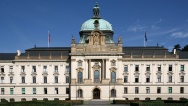News
2. 7. 2012 9:25
June European Council focused on Growth Agenda and Eurozone Situation
The Heads of State and Government adopted a „Compact for Growth and Jobs“ suggesting a number of steps to be taken at the level of Member States, the EU and the Eurozone. It includes provisions supporting economic growth in total value of € 120 bil. The European Council also generally endorsed country-specific recommendations on the Member States’ economic and fiscal policies, which will be reflected in their decisions regarding national budgets, structural reforms and employment policies, thereby concluding the European Semester 2012.
The Heads of State and Government also agreed on the solution to the last open issue concerning the so called patents package, i.e. the seat of the Central Division of the Court of First Instance of the Unified Patent Court. The leaders appreciated success of the Danish Presidency in the Multiannual Financial Framework (MFF) negotiations and emphasized the importance of MFF as the instrument strengthening economic growth and employment.
The European Council also discussed the enhancing of the EU’s Economic and Monetary Union (EMU). President of the European Council Herman Van Rompuy in close cooperation with the presidents of the European Central Bank, the Commission and the Eurogroup presented a report „Towards a Genuine Economic and Monetary Union“, which sets out a vision for the EMU’s shift towards a more centralized banking and budgetary control, deeper coordination of economic policies and institutional changes to strengthen democratic legitimacy and accountability.
Most of the planned agenda was overshadowed by the debate on how to solve the problems which the euro area, in particular Spain and Italy, are currently facing. The debt service of these countries has become more expensive, approaching unsustainable levels. During separate meeting of the Eurozone, leaders agreed on measures that should improve the position of the two mentioned countries. The permanent stabilisation mechanism (ESM) should be newly allowed to engage in direct bank recapitalization. But before that, a single financial sector supervisory mechanism must be established with the involvement of the European Central Bank. Bailout funds – the EFSF and the ESM – will also have the possibility to buy more government bonds of Member States in difficulties.
Concerning foreign affairs, the European Council dealt mainly with the situation in Syria and Iran. The European Council also endorsed the opening of the accession negotiations with Montenegro, which will start on 29th June 2012.






